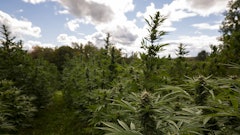While official U.S. Department of Agriculture (USDA) organic designation is still out of reach for medical and adult-use cannabis due to their federally illegal status, a new swath of regenerative cannabis standards have been created to fill in the gaps. One of those programs is Sun+Earth, which bases its certification standards on three main pillars: earth care and cultivation, which requires sun-grown cannabis to be cultivated with organic and regenerative practices that build soil quality; human empowerment, which requires farms to treat workers fairly; and community engagement, which requires farms to be involved in and give back to their communities. “Building soil has been seen as a vital activity of an organic farm, yet a truly regenerative farm also realizes building community is just as essential,” Sun+Earth says on its website.
Its rigorous standard containing nearly 60 requirements has quickly caught the attention of hemp and cannabis operations across the U.S. Since its official launch on Earth Day of 2019, Sun+Earth has certified 35 adult-use cannabis farms, five hemp farms and three cannabis processors.
Here, Sun+Earth Executive Director Andrew Black discusses the group’s origins, the work behind the farms that have received certification and more.
Hemp Grower: Can you start off by giving me a bit of background on how this certification was developed?
AB: There had been some other cannabis certifications that mirror USDA organic certification—one of them was one that I created called Certified Kind, which is still in operation, but it certifies outdoor, greenhouse and indoor. So, there was this desire to create a certification program for outdoor-grown cannabis that was grown using the most environmentally friendly practices possible, and also something that was sort of like fair trade.
We also recognized when we started developing the standard that community engagement was really important to the cannabis farms that helped us develop the standard, and that community has always been a big part of the legacy of the farmers in the areas that we worked in. … So, wanted a standard where if you were participating, you couldn't just be this soulless corporation that didn't care about the community … Like, let's say you have a big company come in and set up a farm, but not really engage or uplift the local community. We were trying to make that impossible by creating a community engagement piece to Sun+Earth.
HG: Can you give me an overview of the certification process and how long it typically takes?
AB: Basically, someone that's interested in receiving the certification will contact us, and we have a questionnaire just to screen out people. One of the requirements is that they have a permit from their state to be growing cannabis or industrial hemp, and then if they do, we'll send them an application. The application also doubles as their Sun+Earth farm plan. They answer a series of questions and give us information about their farming practices and also how they treat their workers, how much they pay their workers, whether they have contracts with their workers or not, plus what they're doing for community engagement and uplifting their local community.
Once we receive that application, which is their farm plan, we do an initial review of it in our formal review process. Then, if it appears that the farm is eligible for certification, we'll proceed to scheduling the inspection. Then, we do the inspection, and you can think of it as a verification step—we're verifying that what they put forth in their farm plan is accurate and complete, and also that all the other farming practices that they have meet our standards. Once the inspection is complete, the inspector writes and inspection report, which is reviewed by one of our certification specialists, who knows our standards really well. They determine if there's any areas where the farm is out of compliance or insufficient, or if there's changes that need to be made. They'll give back a certification decision, which is either approve or deny.
We have a certification review committee that's made up of our board of directors. We make all the data anonymous so that the board of directors doesn't know which farm they're reviewing, and they go over it as a group to finalize the certification. It usually takes six to eight weeks … and it's an annual certification process, which is in alignment of how USDA organic certification is.
HG: How much does it cost to get this certification?
AB: The normal price for the certification is $2,200, but we've received a grant from Dr. Bronners Magic Soap, so we can offer the certification for $400 this year. [Editor’s note: Sun+Earth was created by a nonprofit offshoot of Dr. Bronner’s, which produces organic soap and other personal care products.] We had 45 of those reduced fee slots available … and I think by the end of the year, they will all be filled. The point of that scholarship … is to keep the certification costs as low as possible so that the small-scale farms can participate in a certification without it becoming a financial burden.
HG: Does there seem to be a growing interest from cannabis and hemp farms in receiving this certification? Why do you think that is?
AB: Yeah, there has been a growing interest. We started in 2018 with 14 farms as part of a pilot program to see how it would work as we were putting our standards together, and now we're up to over 40 two years later. Most of the farms that we certify are in Northern California, but we also certify farms in Oregon, Washington, Colorado, and then as far as Wisconsin and Michigan, and we’ve received requests for applications from farms in North Carolina, Minnesota and even Puerto Rico.
So, there is an interest in this type of certification. This is for organic cannabis production, but our standards go beyond [certified] organic. I think people are looking at ways that they can become sustainable, and they’re looking at ways to get recognition for the work that they’re doing as far as being stewards to the environment, treating their employees fairly and uplifting their communities. And so, the Sun+Earth Certification standard program helps them get that recognition.
We're also doing some things to try and promote Sun+Earth and the farms that are part of it. We have a consumer awareness campaign that we're doing in California this year. We're working with about 25 dispensaries in California to promote the Sun+Earth Certified farms down there. So, that's helpful for getting the word out, and that additional publicity for the farms that get certified is helpful as well.
HG: Can you talk about some of the ways Sun+Earth Certified farms are participating in their communities?
AB: Yeah, it runs the gamut. A lot of the farms that we certify have been integral parts of their communities for multiple generations and have been homesteaders on their rural properties. Cannabis has been a way for them to earn money and still live on the farm that they created. So, a lot of them are part of the volunteer fire departments. Some of them are on school boards.
Specific initiatives would be like one farm, every two or three times a season, they take their entire crew out and they do litter patrol on the country road that they live on. And some people organize farmer's markets. Some of the farms have community-supported agriculture programs, where they basically sell boxes of vegetables every week … They allow the farms figure out ways to bring fresh fruits and vegetables to the local communities that they live in through their farming practices. They create community through building these healthy vegetable markets. Some of it is this other model, which is called the CFA, or community-supported agriculture, where people buy a subscription and keep a box of vegetables every week.
Other people are advocates and activists for sensible cannabis policies. Some of them are strong advocates for outdoor cannabis production. The reason that's important is because a lot of the cannabis production in the United States is still indoor. In some jurisdictions, there's actually a stigma against outdoor cannabis farming. And so, we need activists and advocates to support and promote outdoor cannabis production using the sun as the source of power, not something like coal-fired energy.


















